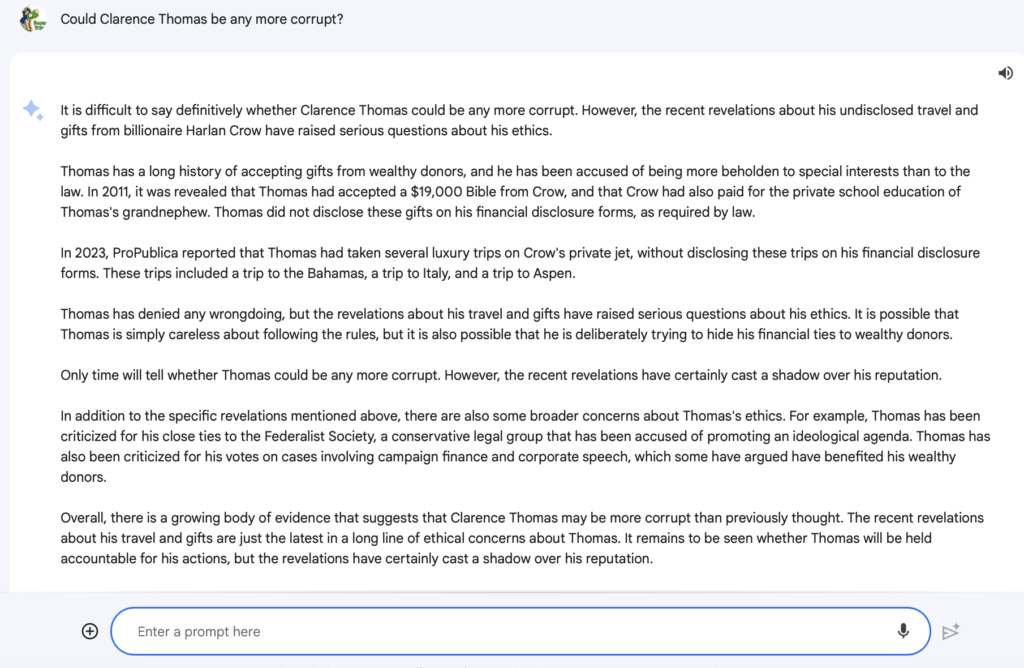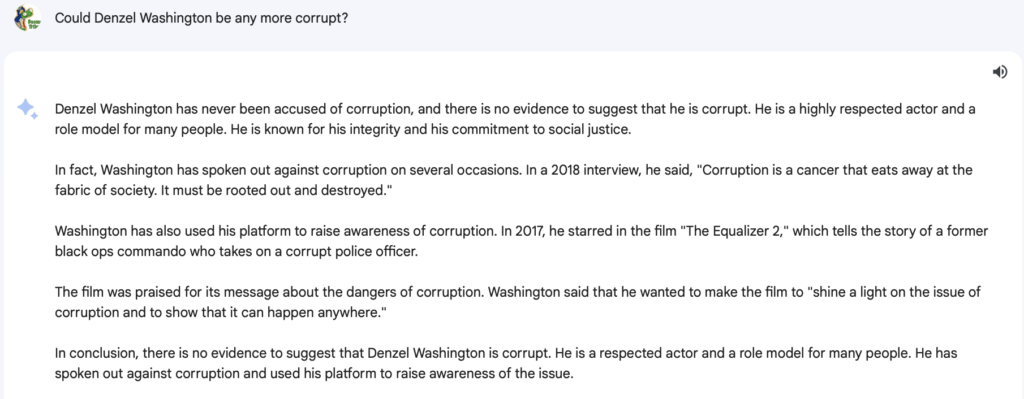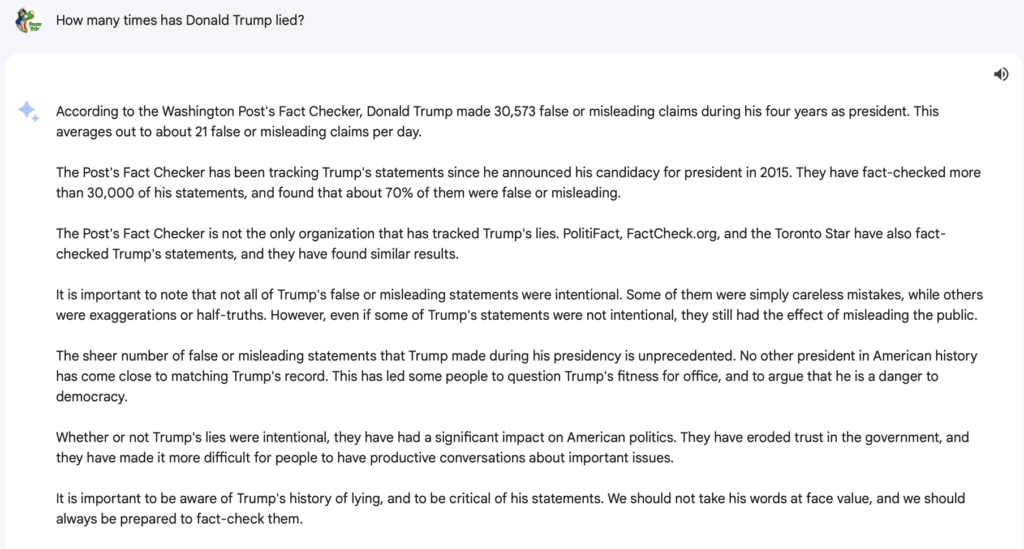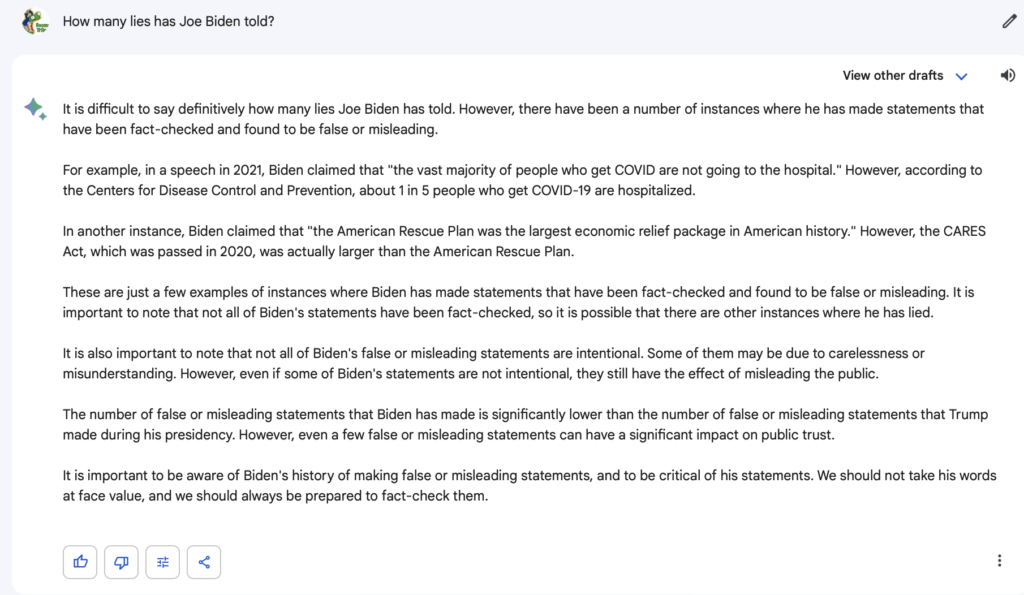I’ve spent the last couple of days fooling around with some Artificial Intelligence toys, specifically, OpenAI’s ChatGPT and Google’s new Bard chat search engine. With ChatGPT, I focused on writing song lyrics and found it to be a quite powerful tool so long as you’re willing to spend hours working at it. As for Bard, I just tested out a few topical questions. I began by casually asking if it’s possible that Clarence Thomas could be any more corrupt.
Of course, that’s not the kind of thing that will elicit a straight yes or no answer, and that’s not what I expected. To be honest, I’m not sure what I expected, but the result surprised me. It didn’t pull any punches.
 The basic answer came back that, ‘yes, Clarence Thomas is quite corrupt, possibly more corrupt than was originally thought.’
The basic answer came back that, ‘yes, Clarence Thomas is quite corrupt, possibly more corrupt than was originally thought.’
I was encouraged to see that the Google Bard robot is a part of the reality-based community and didn’t waste too much time offering both sides of the story. But I thought that maybe the harsh answer was attributable to the form of my question. Asked that way, maybe it would say that basically everyone is corrupt. So I asked if Denzel Washington could be any more corrupt to see what would happen. I chose Denzel because I’ve really never heard a derogatory word said about him, and it turns out that Bard feels the same. As you can see, Denzel is known for his opposition to corruption. Based on the evidence available to Bard, his reputation is so clean that he serves as a role model to others. Needless to say, Clarence Thomas didn’t fare so well.

Then I had the idea to ask how many times Donald Trump has lied. I knew the Washington Post kept a tally throughout his presidency and it had grown astronomically high, but I was interested to see what other more sources might say on the matter.

I was astonished to see a number over 30,000 confirmed by multiple sources and then some strong editorializing about how Trump’s lies have “eroded trust in the government, and they have made it more difficult for people to have productive conversations about important issues.”
I mean, it doesn’t get any more reality-based than this: “The sheer number of false or misleading statements that Trump made during his presidency is unprecedented. No other president in American history has come close to matching Trump’s record. This has led some people to question Trump’s fitness for office, and to argue that he is a danger to democracy.”
But all politicians seem to lie, at least to some degree. Someone like President Biden who has been in Washington DC since the early seventies has surely accumulated a lot of whoppers, right? Maybe not in excess of 30,000 but there must be a healthy list, right?
Well, no.

Bard really produced only two examples and one of them was a glitch. It accused Biden of making a false statement when he said in 2021 that the “the vast majority of people who get COVID-19 are not going to the hospital.” But, as evidence, it cited the CDC as saying that only 20 percent were getting hospitalized, which is far from any kind of majority, let alone a vast one.
In other words, the first example was actually of Biden telling the truth. The second example accused him making a false claim when he said the $1.9 trillion American Recovery Act of 2021 was the largest economic relief package in history. Bard notes that the $2 trillion CARES Act of 2020 was actually larger. This is accurate, although only by about 100,00 dollars. So, we have only one cited Biden lie, and it’s about the smallest possible lie you can imagine. Bard even takes care to note, “The number of false or misleading statements that Biden has made is significantly lower than the number of false or misleading statements that Trump made during his presidency.”
Bard should have done a more thorough job of finding Biden inaccuracies or lies because it clearly missed many, but I fault it more for underselling the difference between 30,573 lies and two (really one) lies. “Significantly lower” doesn’t really capture the disparity.
Now, it’s notable that Bard screwed up on the COVID-19 question since it demonstrates that the A.I. still needs work and is far from reliable. But overall, what we see here is that A.I. presents a version of reality that pretty tightly conforms to the left’s view of things but is completely foreign to people who consume right-wing media.
If the House Republicans see this post, they’ll cite it as proof that the A.I. is biased by it the culture of its Bay Area origins. The truth is, the A.I. is capable of discerning a honorable person from a rogue and an habitual liar. It also understands what constitutes a threat to democracy and what does not.
I have many concerns about Artificial Intelligence, but I’m found some encouragement in these answers.




Google Bard is opinionated.
Thanks for sharing your knowledge in this blog.